MUSE the
EMBRACING KINDNESS

A year of growth and reflection
2023 School Dux Anna Mathew













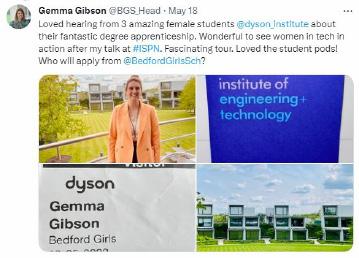






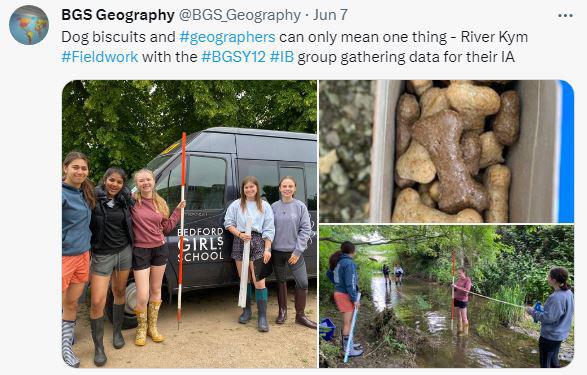











A year of growth and reflection
2023 School Dux Anna Mathew






























I always enjoy the moment of complete calm when everyone has left the building on the last day of the school year. You hear the students leave in an excited whirl and then, after wishing colleagues a happy holiday, the building gradually becomes silent; in this stillness I am able to sit and start to reflect on the past 12 months.
Reflection is a key value at BGS; you cannot underestimate its importance. In the pursuit of knowledge and growth, it is sometimes easy to overlook the significance of looking back on the journey we have undertaken. Taking time to reflect allows us to learn invaluable insights and acknowledge personal and collective progress; it lays the foundations for even more enriching experiences in the future. Reflection helps us to be honest about the things that did not go according to plan and the aspirations that still need more work. Deliberate pauses are vital for us to learn about ourselves and in doing so build our inner core of self-belief and self-confidence.
This year at our Prize Giving ceremonies, we continued with the relatively new tradition of asking every student to write a reflective statement; a thought that they would take with them from looking back over the past year. As they left the marquee, they publicly displayed their reflection on our Values Boards. This simple act of affirmation is an important step in understanding that as a community we not only value reflective practice, but we always value and support each other. We are on this journey together.
This year we were thrilled to welcome the renowned broadcaster, writer and psychologist Claudia Hammond as our guest speaker. Claudia is an alumna of Dame Alice Harpur School (1989) and has built a fascinating career studying human behaviour. Claudia spoke about her extensive research into kindness and the links between acts of kindness and the psychological benefits to both giver and receiver. Her words resonated deeply with the audience as she explained how kindness, rest and reflective behaviour all have huge neurological benefits. Personally, I intend to take up her call for us all to become kindness twitchers; find out why on pages 7 and 8.
I have enjoyed reading the words of wisdom from our new Girls’ Leadership Group as they reflect and offer top tips for maintaining balance in their busy lives.
Like so many of our students they are juggling academic work with sports, arts, community projects and outside interests. Finding the balance does not come automatically, it takes time, practice and periods of reflection to both acquire and maintain. I am sure their advice will be helpful to our younger students navigating similar pathways. Read their tips on pages 5 and 6.
I also hope you enjoy reading about the Combined Cadet Force programme on pages 13 and 14. The skills and experiences that our students gain from being part of this incredible scheme benefit so many aspects of their future lives.
I am delighted to welcome, through the pages of the Muse, Mrs Lynne Gethins to BGS as our new Head of Science. Lynne started in the Summer Term and I hope her interview provides an insight into her passions and ideas. Finally, I always look forward to our back cover feature, Legend in their Lifetime, when a member of staff writes about an inspirational figure in their life. I love being introduced to new stories; being inspired by new ideas and in the process finding out a little bit more about a colleague. We are so lucky to be part of such a diverse and vibrant community and I hope sharing these stories helps bring this alive. It is the coming together of all these melting pots of ideas that creates an outstanding educational environment.
I am hugely excited to start the new academic year. We will have lots to achieve and there will be plenty to celebrate!
Best wishes,
Gemma Gibson Headmistress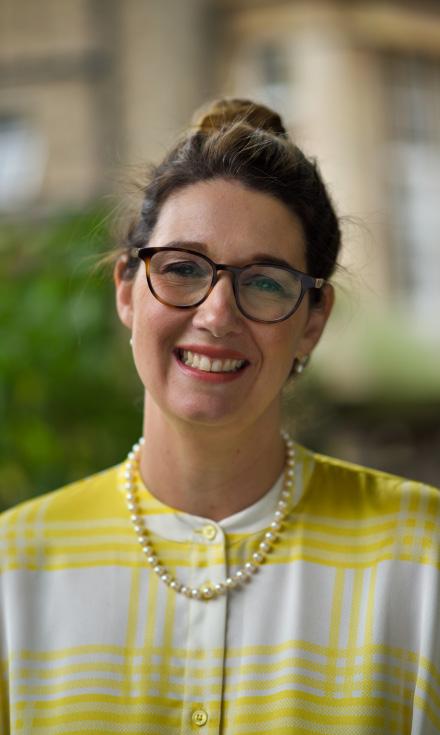
Taking time to reflect allows us to learn invaluable insights, and acknowledge personal and collective progress; it lays the foundations for even more enriching experiences in the future.
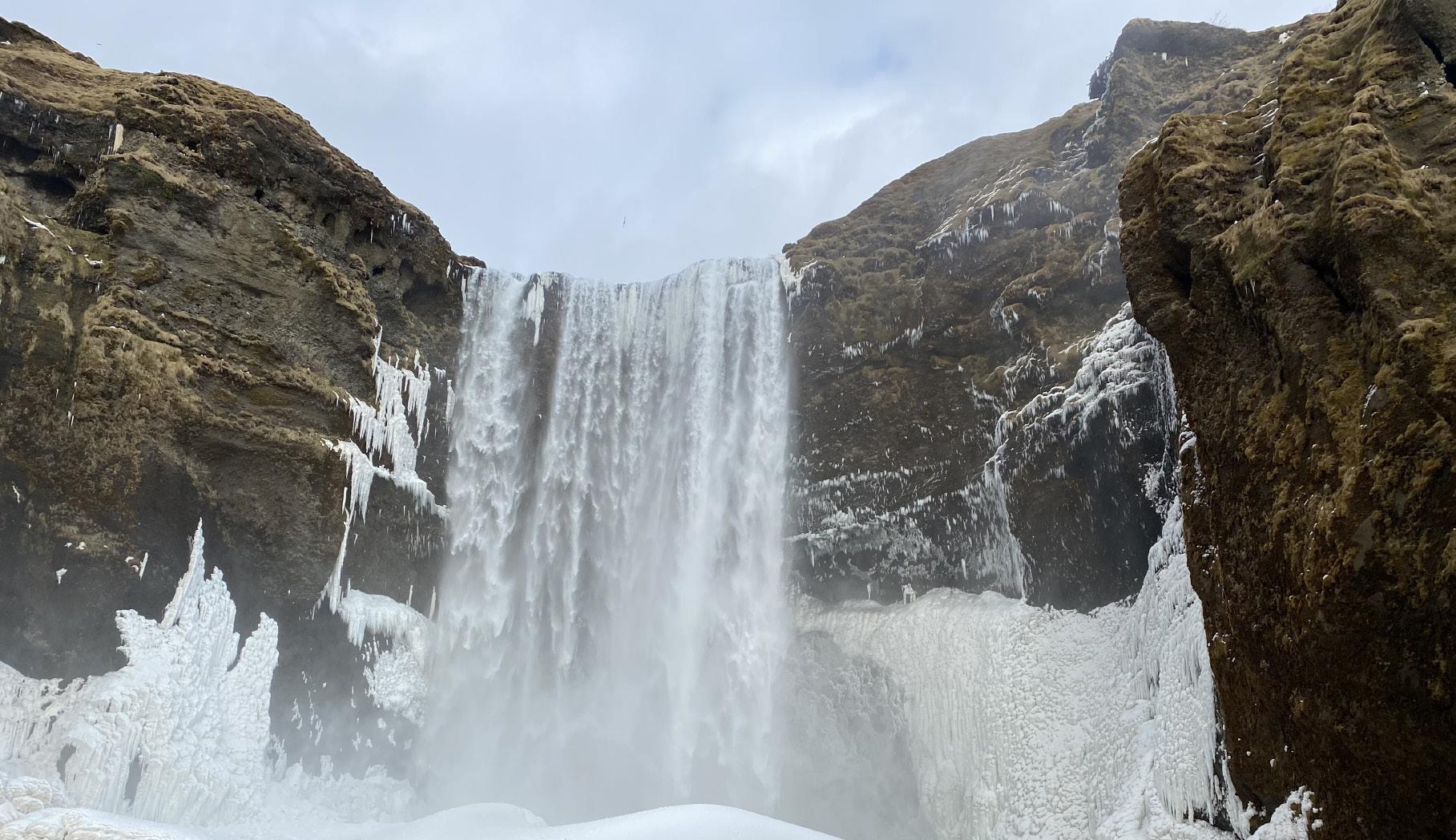
Thursday 23rd March 2023, an exciting milestone was reached at the School — the eagerly awaited first overseas trip since the beginning of the pandemic. A total of 45 students from the Lower and Upper Sixth assembled, donning their stylish Iceland branded hoodies, ready to embark on a once in a lifetime journey.
Upon their arrival, the students and staff were joyfully embraced by radiant sunshine, rendering the concerns of damp waterproofs and fierce gale winds seemingly unfounded. Geography teacher, Mrs Sara McPhail who was the trip leader reflected: “If you have ever watched the film Eurovision on Netflix, you may be familiar with the opening scene of the actors playing a piano right on the edge of the Icelandic coastline. With the backdrop of blue skies, and a statue of a now extinct large Ork, the students were engaged and drawn in to the magic of Iceland. This was
within the first hour of landing at the airport. From this point onwards, during the fiveday, four-night trip the students saw volcanic craters, huge spectacular waterfalls such as Seljalandsfoss, fresh steaming lava from the Fagradalsfjall eruption in 2021, the ice capped Solheimajokull glacier, Strokkur geyser and had the chance to swim in a geothermal pool.
“The opportunity to go on a school trip is something that comes up fairly regularly at BGS across a range of subjects. Geography inevitably lends itself to exploration and we are lucky as a subject to be able to travel and
see places that fit in with our curriculum. Using excellent guides has helped deliver trips that provide educational stimulus along with fun and excitement. Iceland is of course a geographer’s dream location with the tectonic landscape displaying key landforms around every corner, and fits in with topics covered at both GCSE, A Level and IB Diploma. The vulnerability you feel in such a landscape is acute as it really could exhibit a volcanic eruption at any moment.”
Rayburn Tours offers an exceptional level of expertise through their knowledgeable guides, enhancing the overall Icelandic experience. This year, the students were fortunate to have Rob as their guide, a recently retired Sixth Form teacher with extensive experience visiting Iceland. Rob’s profound knowledge of both the country and the subject matter proved to be an invaluable asset throughout the trip.
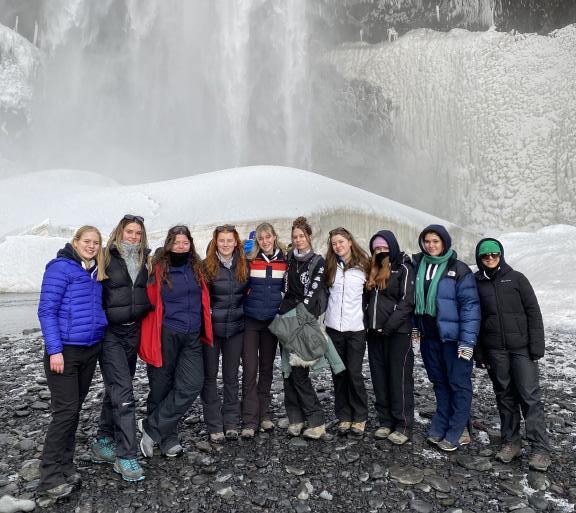

It is, however, the unexpected events that make the memories of a school trip, the ones that can’t be put on a prepared PowerPoint or excursion list. And there were quite a few on this memorable trip...
Will we see them tonight? What time should we go to bed? Will you wake us up? Our hotel on this trip was in Reykjavík, whereas before we had stayed along the south coast in a more rural area, but the weather apps indicated that both locations would be good viewing areas, so all felt happy we were in with a good chance. On Friday evening, after we had all gone to bed, most of the students in the same corridor with Geography teacher, Mrs Page, and me were on high alert. Hearing some noise outside the window, we spied another school starting to gather by the entrance, and yes - it looked like smartphones were angled upwards and social media hits were already happening!
another highlight, not just for the interesting sights but also for the chats that occurred along the way.
Mrs McPhail further explained: “Students arm-in-arm talking and laughing and the excitement generated from Lower Sixth geographer, Emma Cato, and her Geocaching app was fantastic especially when she found the little box in the sea wall. That was a fun moment – again the unplanned and unexpected. Moments like this are still talked about as highlights alongside seeing waterfalls and volcanic craters. We left a BGS memory for others to discover.”
Mrs McPhail explained: “It is the way that different groups of students interact with each other who perhaps have not been on a trip and suddenly find themselves sharing new experiences, a room or row in the coach. New friendships are formed, which is one of the most important consequences of a school trip. The feeling of being away from home or abroad for the first time is special, and as all the trip participants this time were in the Sixth Form, for many, this was their last trip before the revision for A Levels and IB exams began.
“The itinerary that has to be adapted or the extra stop-offs that provide the random opportunities for a supermarket stop can prove as memorable as a famous landmark. Students always love a chance to check out the sweet and chocolate aisles and seeing the slightly unusual Icelandic brands just as much as they value the chance to drive a different route to a destination or go down ‘that road’ a little further, even if it is to a carbon capture plant that, while looking quite James Bondesque, is not that exciting! It was the laughs and the fun we had getting there.”
Mrs McPhail continued: “Then, of course, there are the Northern Lights - always perhaps a chance of seeing them but never an event that can be promised or guaranteed. This year, as soon as we landed to clear skies, the question started to be uttered…
“Shoes on and coats grabbed, we knocked on the doors of the students who were out of the doors like a shot! Mostly in totally unsuitable clothing for the night time Icelandic air as they had gone to bed (it was about 10:30 pm), some with only one shoe on, they rushed to get outside. And there it was - the wonderful splendour of one of the world’s greatest natural wonders - the Aurora Borealis. Geography teacher Mr Thurston and our guide had already worked out a perfect viewing spot away from street lights and on the edge of the coast. The group, now mustered and counted, were escorted across the roads, and there the skies were dancing with huge waves of green. Nature really does trump everything, and parents back home were being FaceTimed so they too could get their Northern Lights fix! Utterly mesmerising and beautiful and a real trip highlight for many. Everyone slept well after that!”
The next night, there was talk among the students of a walk at night into Reykjavík – a circular route to take in the city, get some fresh air and maybe have another chance to see the lights. Although some were exhausted after a busy day of exploration, the majority of the students joined the walk, which proved to be
Following the trip, the tour guide wrote a letter to Headmistress, Mrs Gibson, here is an excerpt: “What struck me was the confidence that the students showed in the way they spoke to me and to anyone we met in shops and the hotel. They had lots of well thought out ideas, which they were prepared to share and discuss and showed a maturity that was refreshing to see. They constantly asked excellent questions and listened to the answers. They certainly were not boring, and their sense of fun and humour certainly made the trip for me. I had many enjoyable conversations about their sporting and academic achievements as well as their lives and what is important to them.”
These final words by the tour guide sum up the power of trips: “I hope the students will remember the trip for many reasons but mostly for the amazing awe-inspiring geography of Iceland. I have learnt lots especially from the chats with them, and I am heartened by the fact that the next generation will be able to sort the mistakes of mine if your students are in charge! Good luck to them all with their exams and their futures, I spoke to some very talented students, and I hope they achieve what they want to.”
Subjects: Biology, Classics, Religious Studies
I try to pursue a plethora of activities alongside school; for example, playing hockey and the piano. I find that these provide a creative outlet and also an overall break from academic work. I have tried many techniques for organising myself and have found that an online Google calendar works best for me; it is easily accessible and allows me to add to-do lists, which are another key aspect of my organisation. I like to set an ‘imaginary’ deadline before the ‘actual’ deadline to ensure that everything gets handed in on time.
IB Subjects: HL Chemistry, Maths, Physics; SL English Literature, Geography, Latin
As someone who pursues many extracurricular activities, from CCF to coxing to performing music, I’ve found balance is often more complex than simply taking up new hobbies. Over time, most people experience ‘burnout’ to some extent, and while this can definitely be helped by participating in extracurricular activities, without carefully organising schoolwork and extracurriculars, they can add additional pressure and increase stress levels. The way I’ve maintained a balance is by scheduling everything, and I mean everything, in my colour coded calendar. This way I can visually see the balance between all aspects of my life for the day ahead.
Subjects: Classics, Drama, Psychology
Throughout school I have struggled with a work-life balance. However, I am finding it much easier now I have implemented some strategies. I stay balanced by breaking down
my longer pieces of work and taking breaks after each section. To relax I enjoy playing board games with my friends and I find this helps me focus on having fun outside of my academics. A squeeze on an ice-cube can also help me stay calm and focused.
Subjects: Chemistry, Maths, Religious Studies
Creating balance in your life is necessary to make sure that you don’t get overwhelmed. The way that I achieve this is by constantly keeping an updated ‘to-do list’: this helps organise my ideas and I love the satisfaction of being able to eventually tick things off! Additionally, I add any upcoming events in my calendar, including days out with friends, as motivation to remind myself that there’s always events to look forward to. Lastly, I consistently leave Friday evening clear of any academic work and personally have found this so beneficial as I am able to relax, whether that be by watching movies, or reading my favourite books.
Subjects: Economics, Geography, German
I love having the time for co-curricular, spending time with friends and family and my part-time job. I like to get my assignments done as soon as possible to prevent them from piling up. I also find it useful to revise little and often, especially important for when learning a language! As a visual learner, I’ve found post-it notes to be perfect for learning new words and definitions, the only problem is my wall is now covered in them!
Subjects: Geography, PE, Psychology
Finding structure within my academic life and my hobbies used to be very hard, I found that I prioritised one aspect of my life over the other rather than trying to achieve balance. However, I have begun to find methods of achieving balance, coming up with clear goals and deadlines for myself, attempting where possible to give myself a gap between homework deadlines and the time of completion, taking extra care to remember that having hobbies (such as golf or reading, which I enjoy), are essential in maximising the effort I’m then able to put back into school.
Subjects: Geography, PE, Psychology
Having been someone who has always been busy with sports and an abundance of other activities, I have had to implement balance from a young age. I find that getting some fresh air, maybe through sports or even a walk can help rejuvenate my motivation and help me retain focus on tasks. To stay on top of my workload and remain organised I find a physical planner is really useful. Being able to write down my tasks assists me in arranging my time to suit my schedule.
Subjects: HL Economics, Maths, Philosophy; SL English, Physics, Spanish
Outside of school I find most of my time is taken up by work, volunteering and other academic programmes. Combined with the IB, this means my timetable and list of tasks quickly becomes hectic.
The Muse asked the new Girls’ Leadership Group (GLG) for advice about how they create and maintain balance in their very busy lives.
To ensure I meet deadlines, I use the Eisenhower Matrix to prioritise tasks. I order them based on their urgency and importance in a 4-way grid. This helps me visualise my work and allows me to relax knowing that the most important things are taken care of. If I feel overwhelmed, I find it useful to talk to family or friends and prioritise a time when I can relax by rewatching my favourite films!
House Captain
Subjects: Economics, Geography, Maths
I like to be busy, and I take part in lots of activities including rowing, music and CCF. Despite this, it ensures I remain on top of my work. I use a timetable in which all my activities can be laid out and easily adjusted. This also helps me visualise when I will be able to take frequent rest breaks. I would therefore recommend mapping out all tasks onto a timetable, as it will help to keep you as prepared as possible.
House Captain
IB Subjects: HL Economics, Geography, Physics; SL English, French, French
I used to often find myself overwhelmed with the amount of schoolwork I had to complete. I found that when I attempted a task after having just rowed or gone to the gym, it almost felt easier. Instead of getting bogged down with schoolwork, it is better to actively do something that you enjoy and know you are good at. I find this helps with motivation and productivity. A top tip of mine for consistently
achieving this balance between school and extracurriculars is to regularly check in with yourself and do some self-care. This can be as little as journaling or even doing your skincare routine.
House Captain
Subjects: English Literature, Drama, Religious Studies
When starting my A-Levels, I noticed a significant increase in workload, so I found it extremely important to find a good ratio of academic to personal life. I find myself playing the piano at any chance I get, which I find relaxes me and keeps me focused on tasks. I highly recommend having passions and hobbies which exercise your mind so you feel you have a comfortable place where you can rewind and reflect.
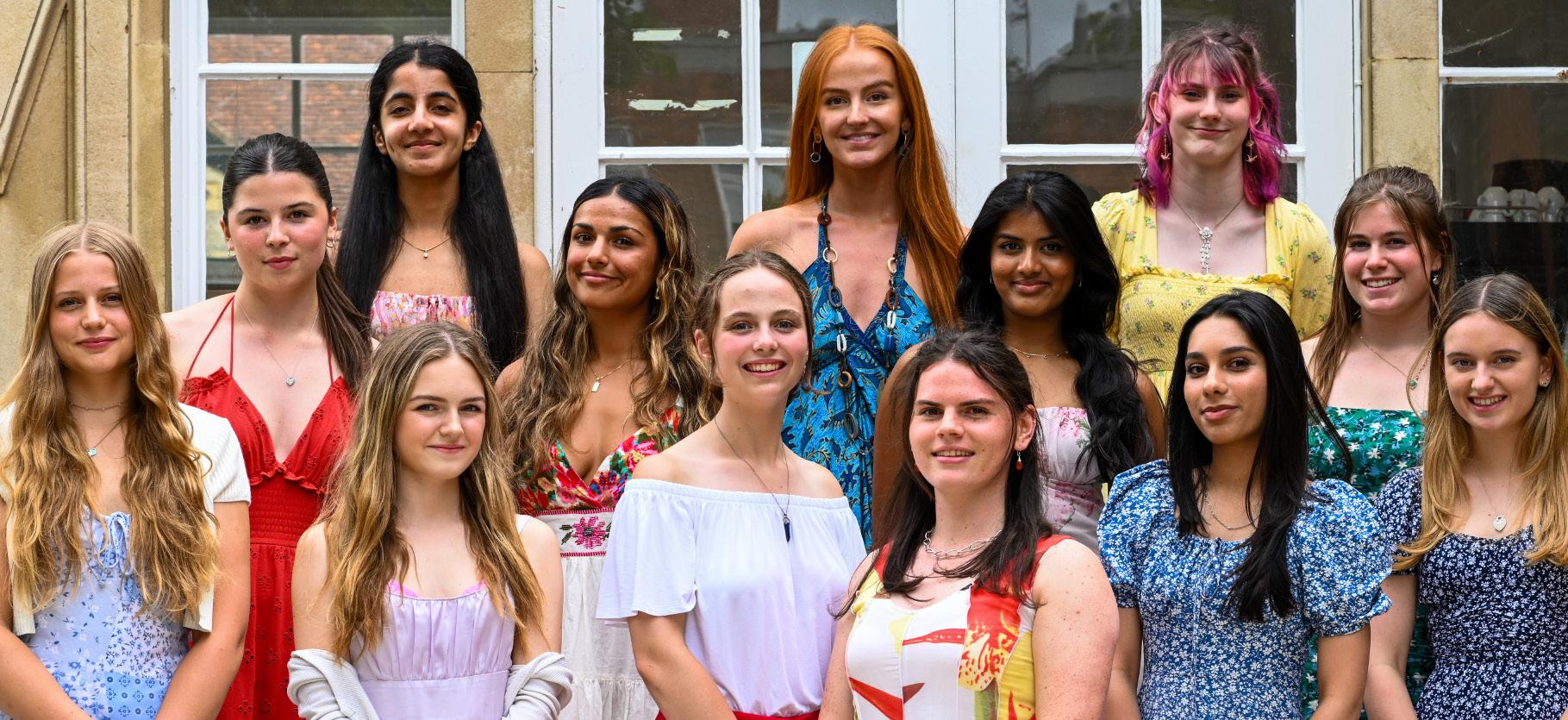
Subjects: Maths, PE, Psychology
Although I enjoy playing a variety of sports in and out of school, I have found in the past I have become very overwhelmed or felt ‘burnt out’ which has led me to implement some easy strategies to help me overcome this. Creating to-do lists, is a quick and effective way to remind myself I don’t actually have as much work as I assume and can plan my upcoming days accordingly. I always remember to put aside time to enjoy myself and try not to stress out when I haven’t completed the to-do list, which allows me to become more focused on completing it or taking a proper break!
Subjects: Geography, Maths, Spanish
Beyond my academic studies I enjoy being active by playing sports. Competing and training throughout the week allows me to distract my mind away from any work, but also help me become more focused and productive once I return to my studies. To stay organised, I keep it simple by adding activities to my Google calendar and making a to-do list using the notes app. In terms of relaxation, I recommend creating a feel-good playlist that you can listen to whenever you feel stressed.
IB Subjects: HL Biology, Chemistry, Spanish; SL English, Geography, Maths
I create balance in my life by incorporating sessions of sport, music and drama into my week. Doing hockey and rowing allows me to broaden my friendship groups and have fun, whilst playing the piano relaxes me. When I feel stressed, I schedule breaks for myself and take yoga sessions. A favourite hack of mine to instantly calm anxiety is dunking my face in a bowl of cold water. I think another important thing is to find an organisational strategy that works for you - for me this is using virtual sticky notes.
Coming together at the end of the School year is an important ritual and Prize Giving ceremonies provide the perfect backdrop to celebrate the achievements of peers, but also to take time to reflect on individual achievements - to acknowledge what has gone well and what we have learnt from our failures.
We use the opportunity of Prize Giving day to focus on one of the school values and this year we considered ‘Reflection’. Every student was asked to write a reflective statement which was then placed on the BGS value boards at the end of the ceremonies. The ritual of taking the time to self-reflect, write and then place the card on the boards reinforces collaborative action and the sense of a supportive community, free from judgement.
At BGS, we greatly value reflective actions and behaviour. We believe it is at the heart of creating a culture of kindness and compassion. The ability to be introspective is a vital skill
and we work hard to encourage it in all of our students; learning to step back to help gain a wider perspective of our actions, words and aspirations. We need to ask ourselves whether what we’re pursuing is truly valuable or just an illusion. Are we chasing after the right goals? Are we acting with compassion and understanding for ourselves and those around us? It takes time to develop this skill, to sit quietly with our own thoughts and to reflect without self-judgement.
During this year’s Prize Giving ceremonies, Headmistress, Mrs Gemma Gibson, reminded the audiences that: “Reflection provides you with an opportunity to learn from your successes and failures. By taking the time to
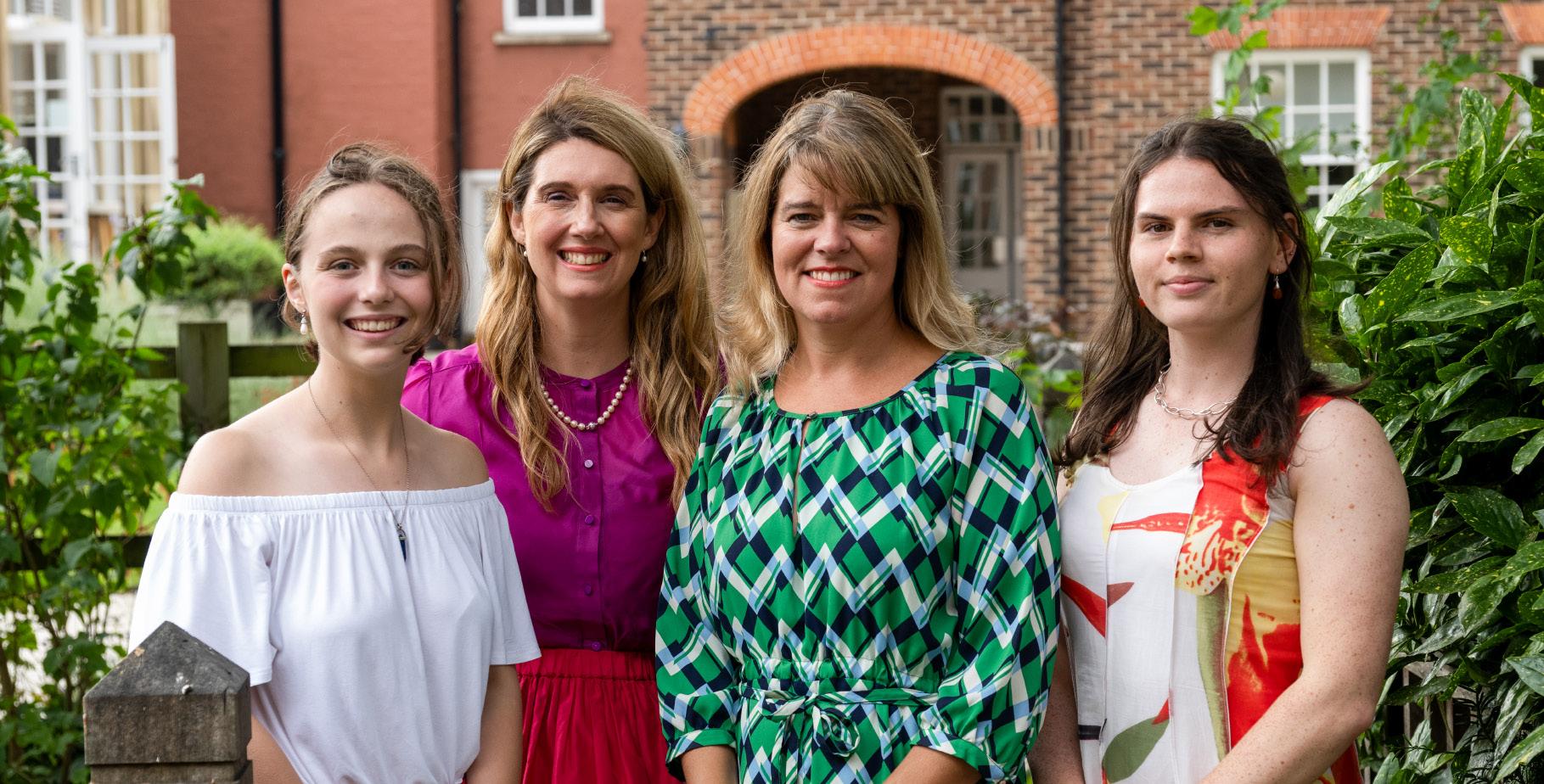
evaluate your achievements, you can identify the strategies that worked well and replicate them in future endeavours. Conversely, reflecting on your failures allows you to analyse the reasons behind them, learn from your mistakes, and devise new approaches.
Reflection enhances your critical thinking skills. As you ponder over your experiences, you begin to question the underlying assumptions, analyse different perspectives, and develop a deeper understanding of complex issues. It encourages you to think independently, challenge the status quo, and form well-reasoned opinions.”
Mrs Gibson continued: “Reflection helps you align your actions with your aspirations,
ensuring that you make intentional choices and remain focused on your objectives, whatever they may be, from what career you want, to learning to play a musical instrument, to taking part in an MUN debate, to winning that hockey match. It empowers you to take control of your education and embrace a proactive approach to learning.
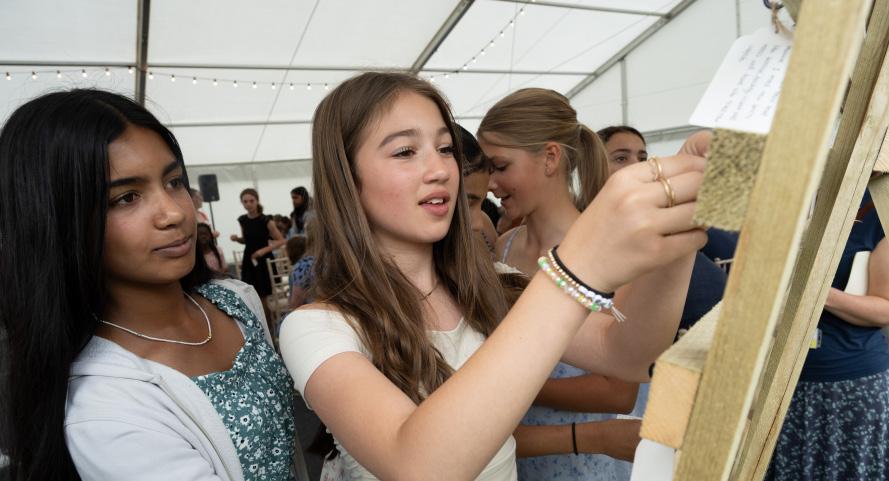
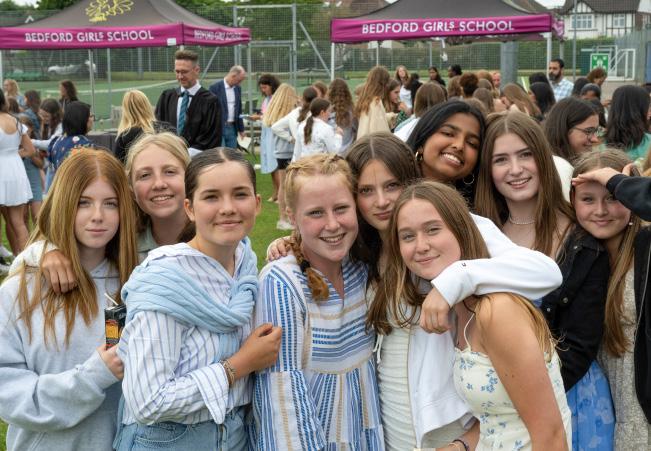
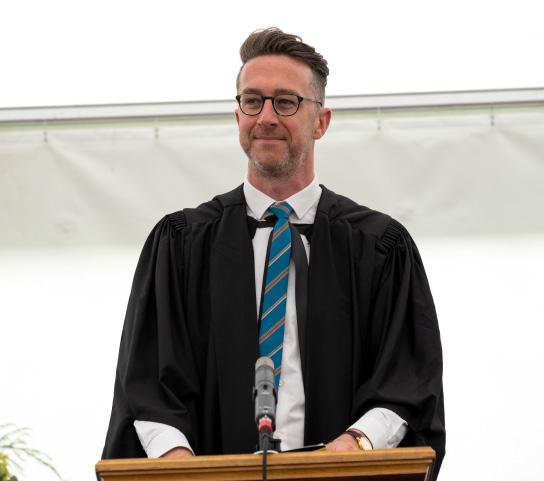
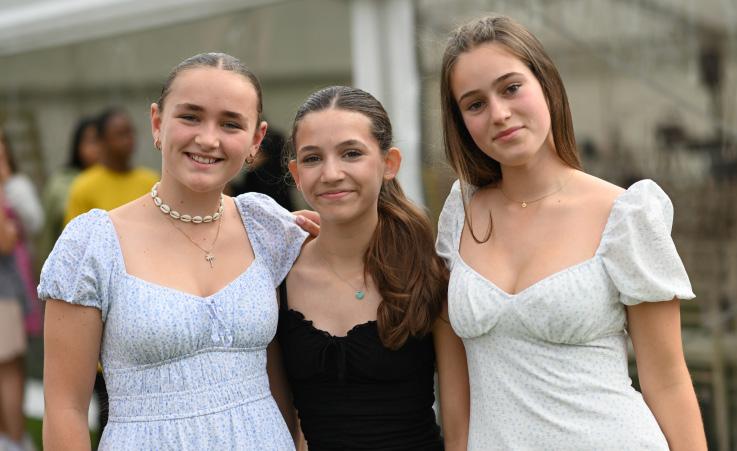
However, one of the most important parts of this school value for me is the profound impact that reflection on our actions towards others, as well as their actions towards us, can have on our lives. Kindness and support are not mere gestures; they have the power to transform our very being. When someone extends a hand of kindness or offers support, it fills our hearts with warmth and gratitude. It reminds us that we are not alone in this world, and that our actions matter. The simple act of empathy can change lives, for both the giver and the receiver.”
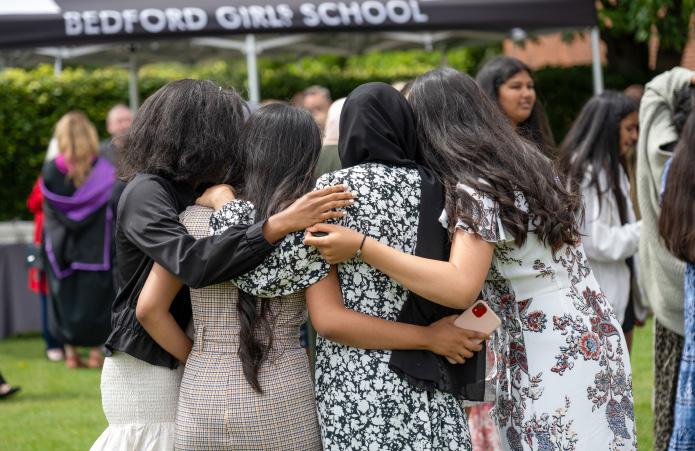

This year we were delighted to welcome 1989 Dame Alice Harpur School alumna, journalist, author, and psychology lecturer Claudia Hammond as our guest speaker. Claudia’s extensive work into human behaviour is highly regarded and her latest bestselling book the Keys to Kindness has uncovered links between
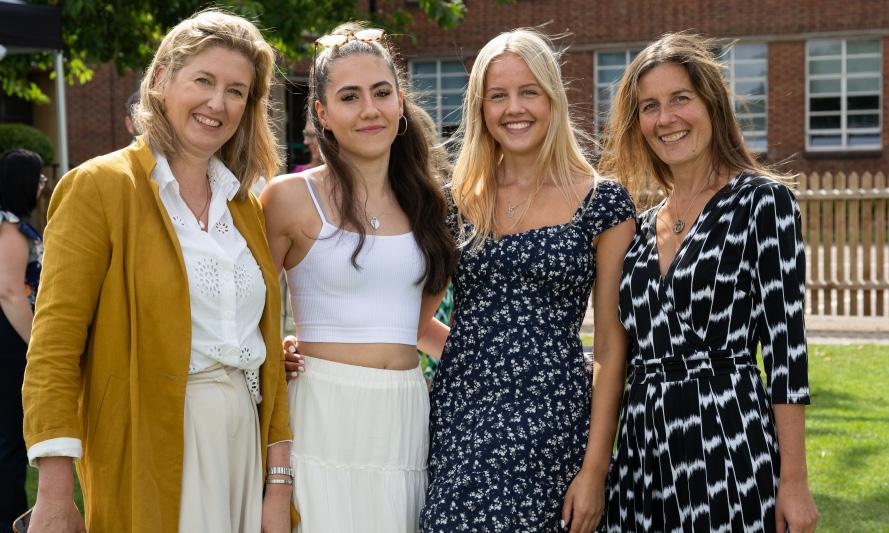
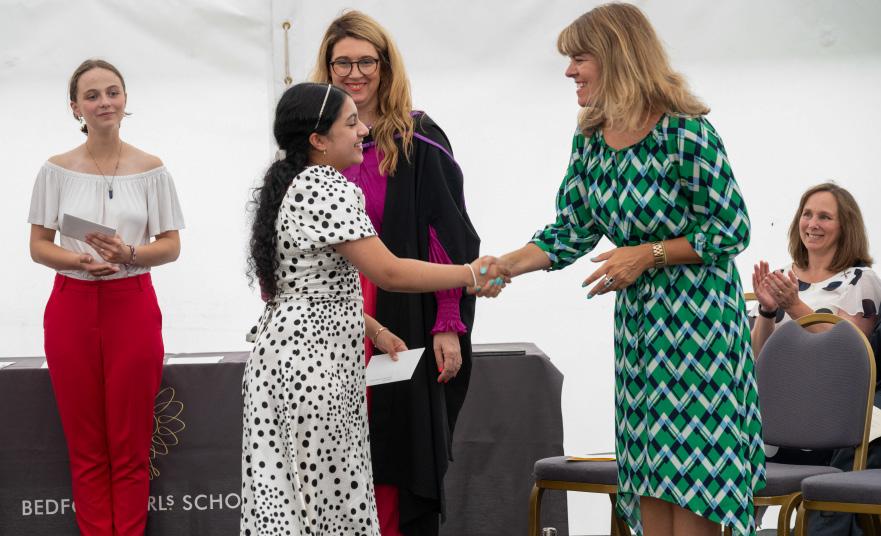
how we behave and the impact it has on our well-being. Drawing upon her research Claudia delivered an insightful and thoughtprovoking speech on the benefit of kindness. Together with a team of academics, Claudia undertook the UK’s largest public survey into the impact of giving and receiving kindness. Her work has discovered that the benefit of kind acts not only impacts the receiver but also the giver, and that the impact lasts way beyond the moment of the action. She encouraged us all to become kindness twitchers; to take time to reflect carefully on the world around us and to actively seek out those, often unspoken, kind acts that are taking place all around us throughout our days; merely by recognising and observing these actions we can improve our sense of well-being. The collective impact is far greater than the act itself. In a world where media is focused on the negative, finding this balance and understanding how widespread kindness can be is reassuring and builds a sense of connection.
Claudia went on to explain that being kind to ourselves is as important as showing act of kindness to others. She drew upon her research into the neurological benefits of rest, explaining how taking proper rest and breaks is vital to our well-being and productivity.
Giving the audience advice and tips she said: “If you are up against a deadline, what you need to do is take a break straight away because there is really good evidence that you pay more attention after you have had a break. There is good research from South Korea showing that a break could be one or two minutes long, ‘microbreaks’ where you lean back in your chair and shut your eyes or stare out of the window for a bit. If you do this, research has shown that you can concentrate better even an hour later.”
Her words resonated with all of the audience. As the BGS community departed for a long summer break, the messages of acting with kindness, and taking time to rest and reflect in order to thrive were very much at the forefront of our community’s minds. In a fast-paced and often impersonal world, belonging to a kind community is more crucial than ever. When we find ourselves in a kind and empathetic community, it becomes a sanctuary, a space where we can be our authentic selves without fear of judgement. Everyone plays a role in creating this community; a community built on kindness, personal reflection and empathy. Within this environment everyone can truly thrive and grow.
The greater the sense of selfownership, the greater agency students take over their learning, their relation ships with others, and their actions. Students become partners in both the learning process and the running of an inclusive school community.
There are many ways in which this is encouraged in the Junior School at BGS: from the collaborative work in the classrooms, through transdisciplinary projects, to peer learning opportunities. But also, importantly, through a structure of student-led groups who work alongside the staff team to champion the views and interests of the Junior School student body.
Mrs Carolyn Howe, Head of the Junior School, explained: “Central to our ethos is educating students who will have the skills and passions to make a difference in the world around them. Right from the word go, we need to foster this sense of responsibility and help them to use their voices in a supportive environment to create actions that improve their community and those around us.
“Viewing students as partners in the running of our community and empowering them to make informed decisions that
influence positive change is the first step in developing the confidence to use these skills in a wider context. It is an important part of their education.”
Across the Junior School, there are many opportunities to get involved. The Junior School Eco Club is extremely popular, and they have successfully introduced a number of green initiatives. The Diversity and Inclusion Group has worked to educate the community on a wide range of cultures through assemblies and has run activities to support Pride Month and commemorated Black History month by asking students to decorate classroom doors.
Mrs Howe commented: “Our Junior School Girls’ Leadership Team is made up of Year 6 students who volunteer; they act as role models and mentors to our younger students, helping them understand how different attributes and personalities are needed to create an effective group. As they go through the Junior School, many of our students aspire to be part of this team.
The Head Girl’s Team have run lunchtime activities for younger girls, such as Easter egg hunts, and made sure there is always someone near the Buddy Bench to be a supportive friend.”
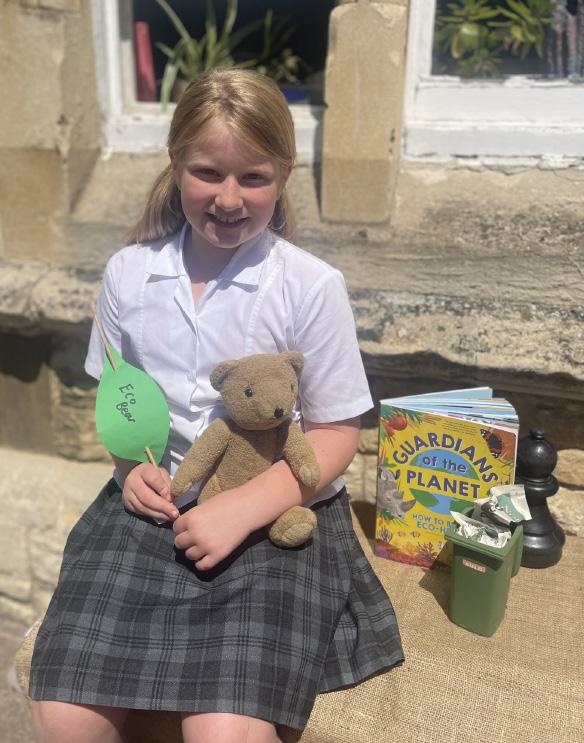
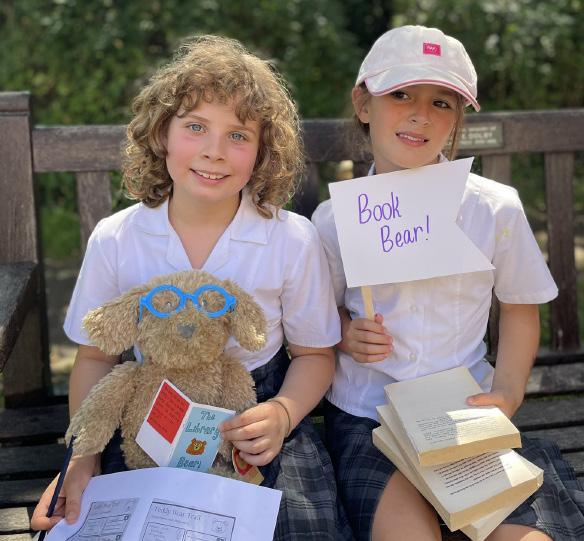
Meanwhile, Student Voice encompasses students from all year groups and plays a vital role in making sure everyone’s voice is heard.
Miss Hannah Coote, Junior School teacher and Student Voice Coordinator, reflected on the role of the Student Voice over the past academic year: “The group has shown immense creativity and a strong sense of community. They have been extremely active and spent time understanding the needs of the student community and then developed programmes to support them, whether it was through organising the Christmas collection in aid of Bedford Foodbank or meeting with Green’s Kitchen to have input and feedback on items on the lunch menu.”
“Earlier this year, Student Voice audited our current playground equipment, ran surveys with students to determine the type of equipment they would like to have, and then delivered a proposal of new items to Mrs Howe, which have now been ordered. This demonstrated how taking informed action can create positive change while strengthening their communication, research, and data analysis skills along the way!”
Miss Coote added: “Student Voice wanted to celebrate the end of the school year and organised a fantastic Teddy Bear Trail for the end of term. The trail was an opportunity for our young learners to showcase their boldness, imagination, and reflective thinking. They carefully planned and considered different props and books associated with the teddy bears, creating a trail that was both exciting and educational. They went above and beyond to create an experience that engaged the minds of our younger learners. They crafted thoughtprovoking questions that linked to the props and books, stimulating the girls’ curiosity and encouraging them to explore new ideas.”
Mrs Howe concluded: “I am always extremely proud of our community; it is built on a spirit of collaboration and kindness. Our students exemplified the values of empathy and open-mindedness. It is exciting when I look out onto the gardens; I see a school full of future change-makers!”
The IB Primary Years Programme (PYP) curriculum framework begins with the premise that PYP students are agents of their own learning and partners in the learning process.
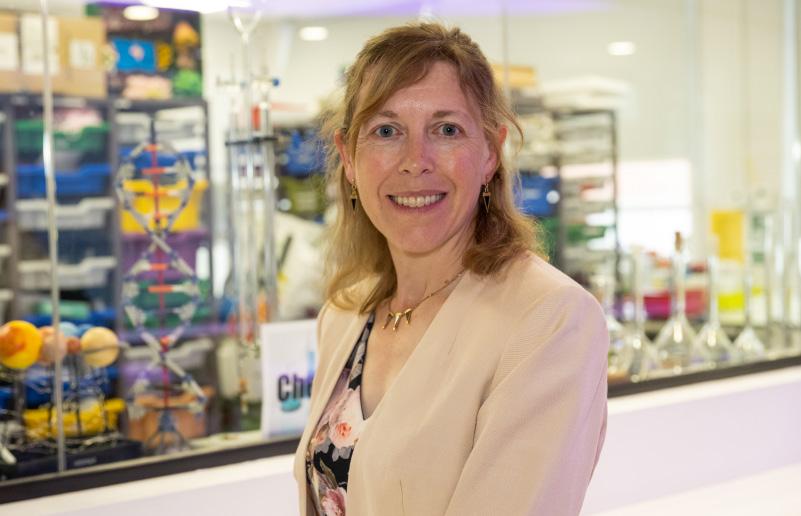
Can you please tell us a little bit about your teaching background?
I have been a Science teacher for over 30 years, taking roles in many different settings including Comprehensive, Independent and Grammar Schools. Prior to arriving at BGS, I was Faculty Leader for Science at Silverstone UTC, which was very exciting, working in close range of the famous racing track! Before that, I was Head of Chemistry at Sir Henry Floyd Grammar School in Aylesbury for 12 years.
What was your favourite subject at school?
I enjoyed studying the three sciences, but my favourite subject was Music. I still play the piano, the cello and the guitar. At school I took part in many music groups including orchestra and Madrigals choir.
What/who inspired your love of science?
Science is a subject that I have always found fascinating. Studying Biochemistry at university was exciting as it was a very rapidly-developing area of science, and there were new discoveries being made all the time, particularly in gene-sequencing and manipulation. I still follow the latest developments in the subject, especially the way that research can find solutions to worldwide problems, such as diseases, climate change and the development of new fuels and materials.
What attracted you to work at BGS?
BGS has an excellent reputation and I was attracted by the prospect of motivating and empowering girls to consider careers in STEMrelated fields. Sadly, there is still too much gender imbalance in many areas of STEM and I am excited to be part of a team which has a mission to challenge gender stereotyping.
What is your ambition for STEM at BGS?
BGS already has an outstanding reputation for STEM subjects and higher than average numbers taking these subjects in Sixth Form and on to university. My ambition is to see even more girls taking Sciences, Technology and Maths in the Sixth Form.
The Science Department team is planning lots of co-curricular opportunities, trips and events to motivate the students to explore careers in these subject areas. For example, we are introducing Cosmic Mining as a co-curricular opportunity, so students can investigate and research spectra for the James Webb telescope.
I am keen to provide opportunities for students to take part in national competitions and the STEMM awards - which replicate the Duke of Edinburgh’s Bronze, Silver and Gold Awards for scientific, technical, engineering, mathematical and medical achievement. I hope to help our students to think broadly and consider apprenticeship options as an entry into some exciting STEM fields.
I am also keen for more of our Sixth Formers to explore “super curriculum” opportunities, to help them build strong personal statements and CVs.
If you could give one piece of advice to yourself at 16, what would it be?
At age 16, I would advise myself to have more confidence in my own ability and to be more ambitious.
I hope I am able to communicate this to my students; trusting your intellect and not being afraid of making mistakes is key to being successful.
How do you like to spend time away from the office?
I play the cello in a string orchestra and I enjoy walking, running, cycling and swimming in my spare time.
Charlotte Gray, starring Cate Blanchett. I like watching films that are set in a particular period of time and which give a historical context to the storyline. I also enjoy watching films that make me laugh.
Who is your scientific heroine?
I would have to say Rosalind Franklin, especially because I am in Franklin House! But most importantly because she was such a ground-breaking scientist and has always been an inspiration to me.
When I was growing up there were so few examples of outstanding women in the STEM fields. Thankfully this is now changing and women are finally receiving the credit they deserve for their contribution to science. The students at BGS are so lucky to be regularly introduced to extraordinary role models, from Year 3 onwards, either from the public arena or through the wide range of our own alumnae working in a plethora of different fields. I was very excited to meet the material scientist Dr Anna Ploszajski this term, and am looking forward to welcoming many more speakers into school next year. I am a great believer in girls being able to have positive role models to help guide them towards realising their aspirations.
After your first term at BGS what has stood out to you the most?
I’m so impressed by the range of co-curricular activities that are offered to students at the school. Even in my first term, I’ve attended the Bedford Regatta and the summer concert, both of which I really enjoyed. I’ve never worked in a school where there has been quite so much going on, so many trips to different places and opportunities for the students to discover something they enjoy and that they are good at. I’m also really appreciating the school’s sense of community.

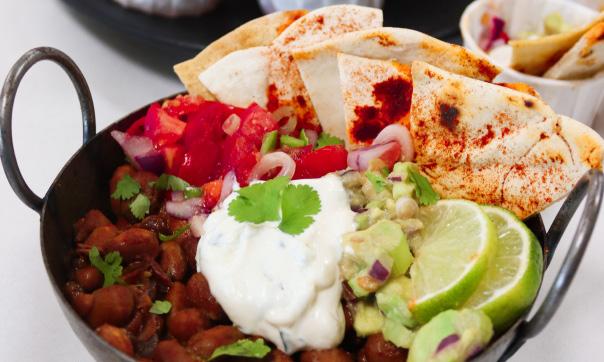
At Bedford Girls’ School, the Food and Nutrition programme goes beyond learning to cook. It is a dynamic learning experience that equips students with essential attributes while aligning seamlessly with the school’s educational philosophy; ensuring that the students develop a wide skill set, which will arm them with the ability to tackle the challenges and opportunities of the wider world.
Head of Food and Nutrition, Mrs Toni Lovett, explains the skills fostered through the Year 9 Street Food Showcase.
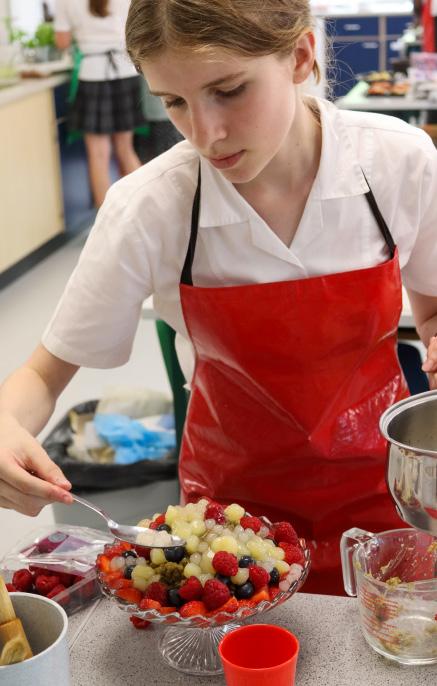
“Our curriculum ensures that the students study the varied aspects of food, understanding the links to science as well as historical and geographical aspects of food origins, whilst also looking at the health benefits associated with dishes that they are preparing. The Street Food Showcase event, run by students, exemplifies the importance of Food and Nutrition in fostering valuable skills and embracing the principles of the International Baccalaureate (IB) learner profile. As Head of Food and Nutrition, I couldn’t be prouder of the students’ hard work and dedication throughout the project.
The Street Food Showcase project provided an opportunity for Year 9 students to immerse themselves in comprehensive research on street food and food trends. By exploring various cultures and cuisines, students broadened their horizons and developed a global awareness. This research component of the project fostered critical thinking, resourcefulness, and the ability to analyse and evaluate information effectively.
Mrs Lovett continued: “Within the Street Food Showcase project, students were encouraged to design their own street food menus. This process sparked creativity and innovative thinking as they considered dietary preferences, food trends, and cultural influences. By developing menus that catered to diverse tastes and dietary needs, students practised problem-solving and decisionmaking skills. I was delighted to witness the students’ imaginative menu planning and their ability to incorporate unique and exciting elements into their culinary creations.
In the weeks prior to the showcase, students trialled some of their dishes to refine their menu. Mistakes happen and are often feared by students, but are actually so useful, teaching students the importance of persistence, resilience and the ability to learn from failure. Many students begin to understand the importance of making these mistakes and how they help them to improve. Many of them put a huge amount of care into presenting and photographing their dishes.”
The culmination of the Street Food Showcase project saw students setting up stalls and presenting their work to the school community and visitors, giving them a tangible

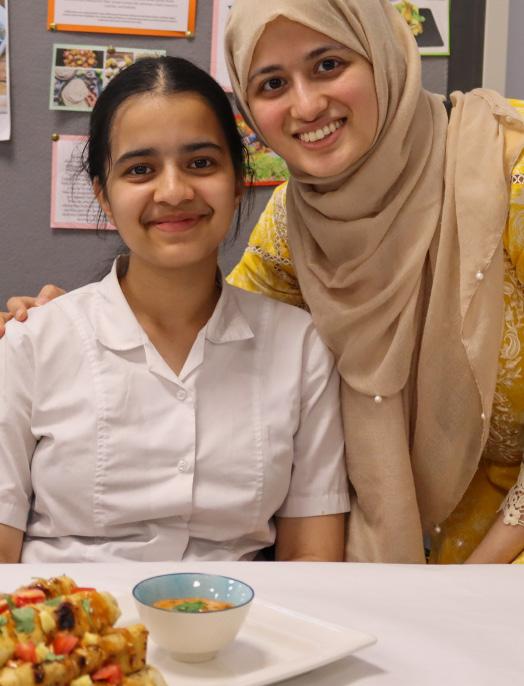
experience. They worked together to create inviting stalls with displays of the resources they had been working on, showing dishes and samples for guests to try. The students had all worked so hard; many of them had come to start cooking as soon as they had eaten lunch and didn’t sit down until the event.
Mrs Lovett concluded: “I was so impressed with their strong work ethic, their ability to work collaboratively, and the professional manner in which they presented their stalls. For those who are continuing their studies at GCSE, this project will support them perfectly with the Food Preparation Task. Food and Nutrition at BGS is more than just a subject; it is a vehicle for developing expertise and embracing the principles of learning, nurturing attributes that are essential not only in the culinary world but also in various facets of life. Through the Street Food Showcase project, Year 9 students acquired knowledge, honed critical thinking skills, and embraced an entrepreneurial spirit. By emphasising research, creative menu planning, dish trialling, and practical application, the project fostered a sense of ownership, accomplishment, and self-confidence in students.”
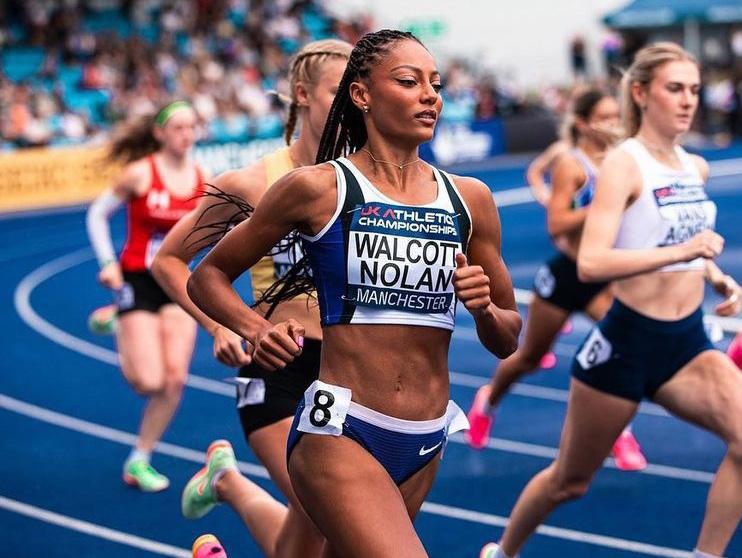
During a rain-soaked weekend on the 8th July, a remarkable moment unfolded in the history of BGS sport. For the very first time, we proudly witnessed the participation of three accomplished alumnae: Revée Walcott-Nolan (2013), Kate Axford (2017) and Rebecca Murray (2013), alongside Upper Sixth student, Etienne Maughan at the same athletics meet. They showcased their talents at the prestigious UK Athletics Championships in Manchester, which included a star-studded line up of the very best UK athletes.
For these athletes and many others, the journey began at BGS. The athletics programme is led by PE teacher, Mrs Pippa Milton with support from the whole PE department.
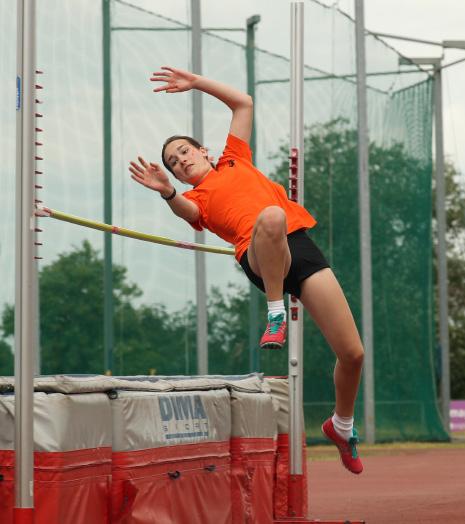
Mrs Milton explained: “Athletics takes centre stage during the vibrant Summer Term at BGS, where the PE staff dedicate their efforts to honing the skills of our young athletes. The focal point of training sessions, sports days and thrilling competitions take place at the Bedford International Athletic Stadium (BIAS). This venue provides our talented athletes with an exceptional environment to showcase their abilities. The comprehensive athletics curriculum encompasses students from Years 3 to 8, ensuring that each participant receives valuable instruction to improve their performance and cultivate a passion for the sport.
“From Year 3 core running, jumping and throwing skills are taught in curriculum lessons. From Year 5 students start to attend competitive athletics meets, when they compete against other local schools in the District Athletics League. This is a fantastic opportunity to experience the atmosphere and pressures involved in an athletics competition. This season our U11 A team have been regular weekly winners of the League.
The Year 7 and 8 athletes have had a great season and for once the weather has been on our side!”
The Junior School athletics season culminates in the Regional East Prep School Athletic Championships and this year our exceptional Years 4 and 5 athletes ventured to the Cambridge University Athletics Track to vie for glory. Among the standout performers was Sophie Morris, who demonstrated her exceptional abilities by qualifying for the 75m final. Meanwhile, our Year 6 team competed admirably at BIAS, joining forces with their Year 7 and 8 counterparts.
Drawing inspiration from the experienced Year 8 athletes, the athletics season kicked off with the formation of two combined Years 7 and 8 teams in the local league. Week after week, the performances improved, culminating in one team qualifying for the Finals and subsequently securing victory.
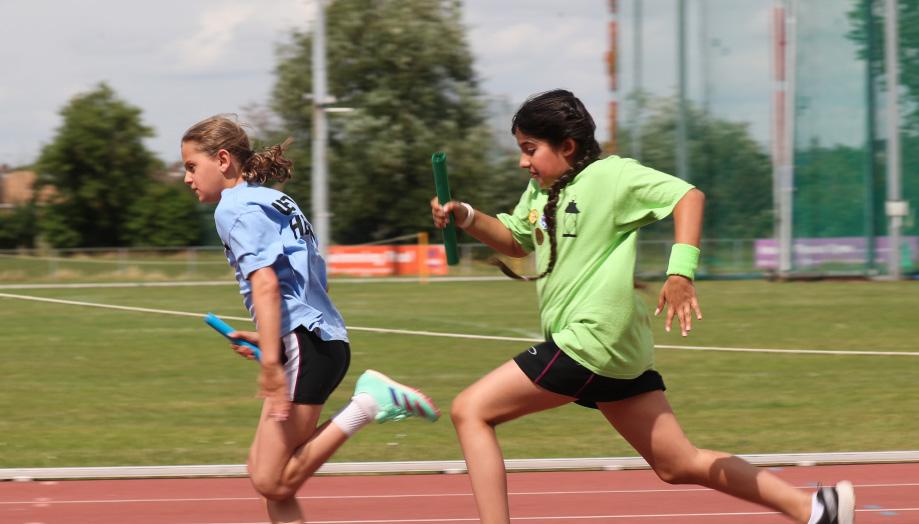
The much-anticipated District Athletics Championships on Friday 19th May saw the Years 7 and 8 participating in a day of fierce competition. An event which attracted more than 20 schools, each age group was limited to one athlete per event. Mrs Milton reflected: “There were many notable achievements during this event including Year 8 athlete, Jaya Hall, who claimed victory in the 200m, clocking an outstanding time of 27.7 seconds. Our Year 8 relay team comprising of Sienna, Nazor, Sophie and Jaya secured yet another first-place finish. The Year 8 team soared to second place overall and the Year 7 team secured an emphatic firstplace finish.”
The following week on Wednesday 24th May, witnessed the Junior (Years 8 and 9) and Intermediate Girls (Year 10) battling it out. The Years 8 and 9 athletes showcased their tenacity, securing an impressive second-place finish. Meanwhile, the Intermediates clinched a commendable third in their highly competitive category.
The ultimate test of the athletics squad strength and depth lies in the fiercely contested Track and Field Cup competition. The School’s Junior team of 12 athletes, participated in two events each (one track and one field); they showcased their skills and earned valuable points for the team. Noteworthy performers included, Megan Barnicoat, with an impressive 37 points, and Emily Foster, contributing 30 points. The success in the first round propelled BGS to the Regional B Finals in Essex, where the School secured a commendable joint fourth-place finish.
The summer season continued with the Years 9 and 10 athletes excelling in various competitions and achieving remarkable personal bests. In the Athletics League, both teams emerged as champions, consistently scoring high averages: Year 9 with 174 points per week and Year 10 with 183 points per week. Impressive performances included Isla Campbell’s 12.65 second 100m sprint, Jessica Parrish’s 2:28 800m run, Olivia Fox’s 8.91m shot put, Neva Grimshaw’s 45.4 second 300m run and Milly Perry’s 1.35m high jump.
Mrs Milton added: “In the height of the season, 18 athletes from our intermediate squad competed in the district athletics. We celebrated multiple victories, including Neva Grimshaw’s triumph in the 300m, Zofia Wylezek’s victory in the 800m, Charlotte Proctor’s success in javelin, Isla Campbell’s first-place finish in the 100m and Lucy Nissen’s achievement in the 400m hurdles. Following this event, 15 out of the 18 students were selected to represent North Beds in the County Athletics competition the following week, which North Beds won!”
Director of Sport, Mrs Mason-McLeod concluded: “Under the guidance of our PE department, our athletes honed their skills at various events, achieving victories, personal bests, and team accomplishments. The success of the programme is a testament to the athletes’ hard work, supported by the dedicated staff.”
Come Wednesday afternoon at Bedford Girls’ School you will see students immaculately dressed in their service uniform from their particular section, ready for an afternoon of field training, flight simulation and team building with Bedford School.
The Combined Cadet Force (CCF) is a popular co-curricular activity at Bedford Girls’ School with over 130 students participating from Year 9 onwards. As a partnership between BGS, Bedford School and the Ministry of Defence (MOD), the cadets encounter a range of activities that they would not normally experience, and through these they develop leadership and communication skills and ultimately confidence. From adventurous activities such as sailing, to learning how to properly use a radio, to going for a flight in a Grob Tutor, CCF offers our students the opportunity to try things out of their comfort zone.
The Bedford Girls’ School CCF is led by Mrs Pippa Milton, who is a Lieutenant with the Royal Navy and Dr Chris Tansell, who is a Flight Lieutenant with the Royal Air Force. They are responsible for the safe running and administration of the Cadets, which is made up three sections: the Royal Navy (RN), the Army and the Royal Air Force (RAF). Dr Tansell, who volunteers many hours to the CCF activities reflected: “Our aim is to provide a disciplined organisation in our school so that students may develop powers of leadership and promote the qualities of responsibility, self-reliance, resourcefulness, endurance and perseverance.
“CCF is a thriving co-curricular opportunity for students at BGS, it provides a framework through which the cadets can develop qualities of endurance, resourcefulness, selfreliance, responsibility and leadership. It also aims to engender a sense of public service. Membership of the CCF is voluntary, with
cadets joining from Year 9. Cadets choose the section that most appeals to them and then take part in activities appropriate to that service. We have parade evenings, when we cover the training syllabus, for all cadets after school on Wednesdays at Bedford School.”
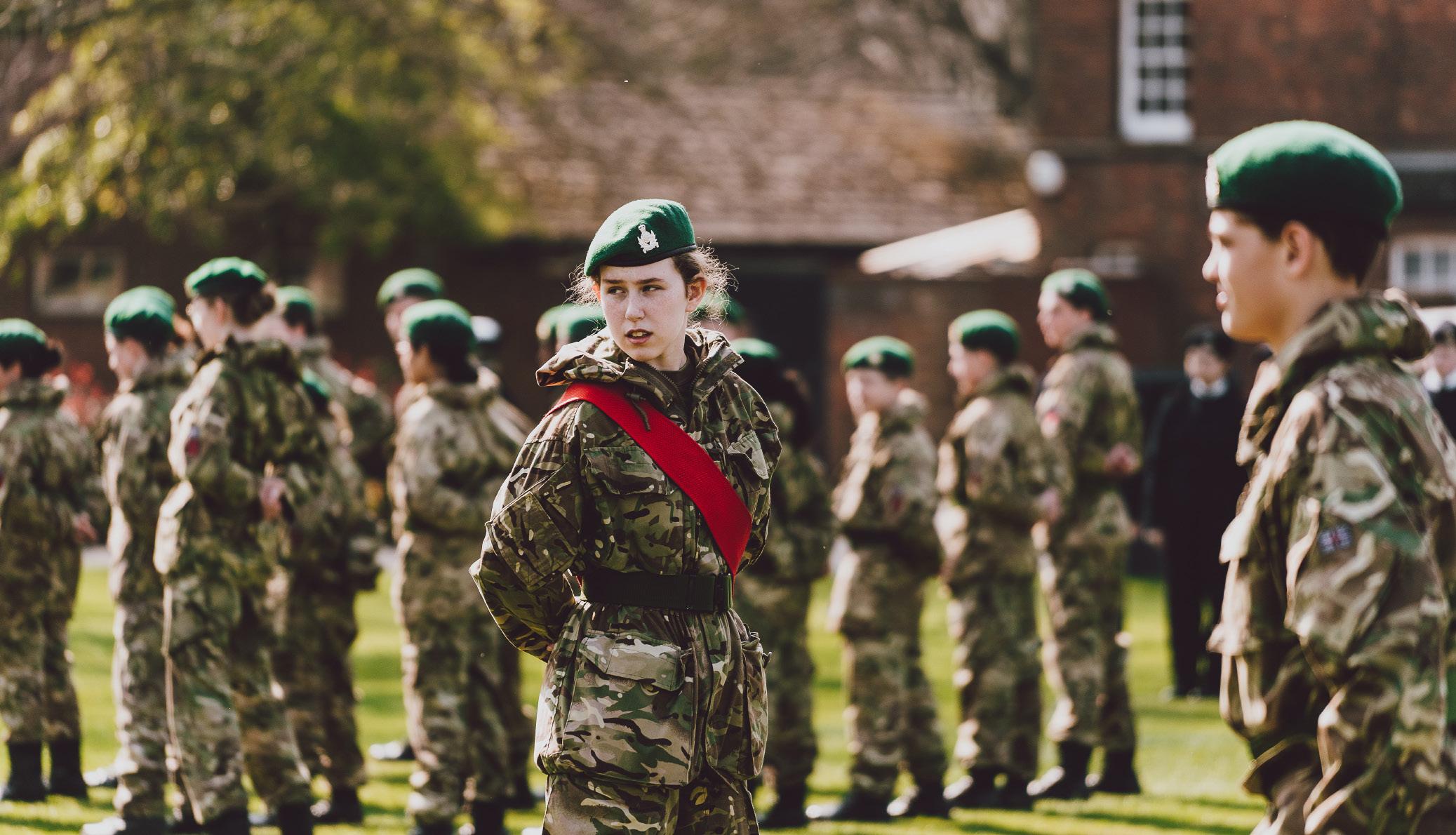
On a week-to-week basis, the cadets can be found doing a multitude of activities, including climbing, shooting and marching. The older, higher-ranking cadets are tasked with trying to teach the new recruits about things like basic navigation or the principles of flight. You will also often find cadets practising specific skills in preparation for upcoming competitions or courses. These competitions test many of the cadets’ military skills, such as First Aid, Rifle Shooting, and Aircraft Recognition.
In addition to the weekly training, the cadets attend camps. Dr Tansell explained further: “During term time, we organise one or two weekends away while longer camps are
“The ability to learn is the most important quality a leader can have.”
Padmasree Warrior, CEO & Founder, Fable
organised during the holidays. As well as the UK based camps and visits, there are many opportunities for cadets to travel abroad. Senior cadets are also offered the chance to go on specialist courses during which they can experience the very best CCF military and adventurous training.
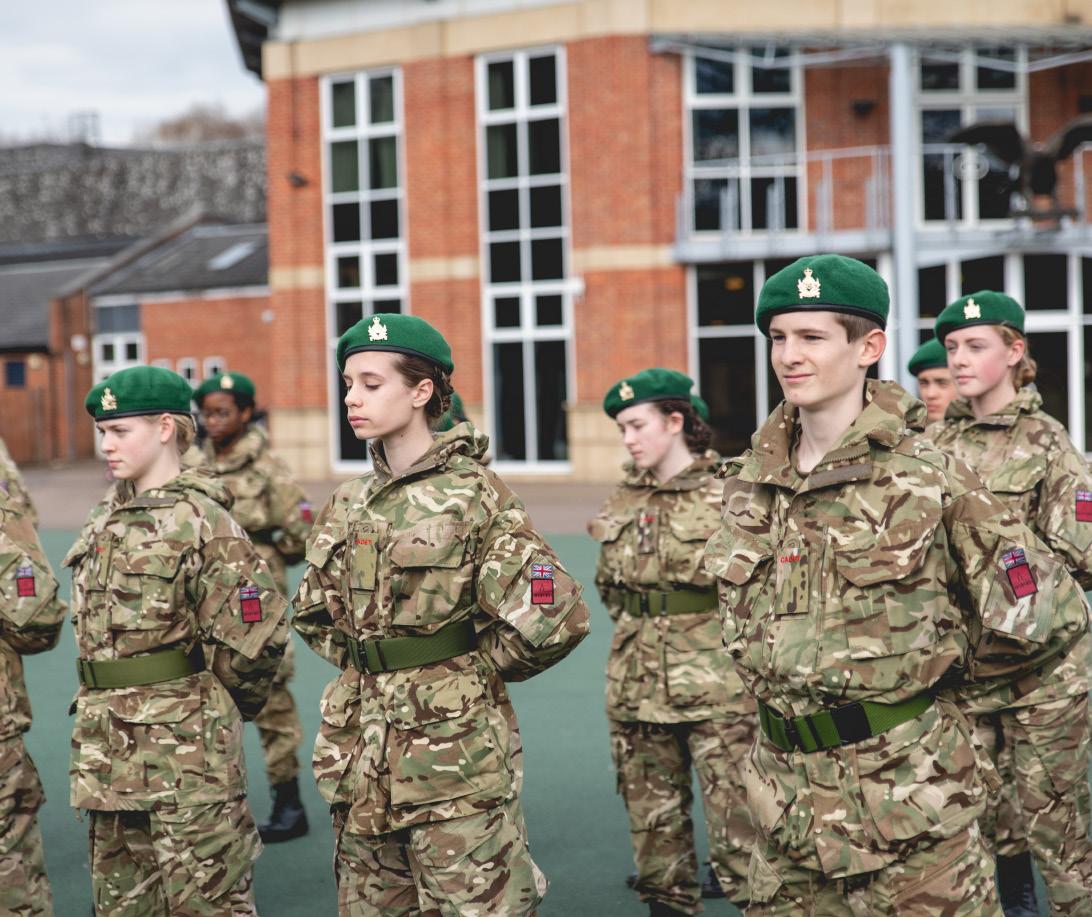
“The Contingent is directed and managed by a dedicated team, consisting of teaching staff from both schools who have been commissioned into the forces with officer status and trained specifically to serve the cadet force. Our Contingent Commander and RSM are both ex-military, they bring with them a plethora of experience and talent. In addition to our own CCF officers, we are routinely joined by regular forces personnel.”
Year 10 Army Section Cadet, Licia Cacioppo, reflected on the skills CCF has developed for her: “As a 15-year-old CCF Army Cadet, I’ve discovered that the CCF has been an extraordinary catalyst for personal growth. It has armed me with self-discipline, teamwork, and resilience, moulding me into a young individual who is ready to face any challenge head-on.
“The CCF has not only broadened my horizons but also instilled a sense of purpose and commitment that will stay with me throughout my life.”
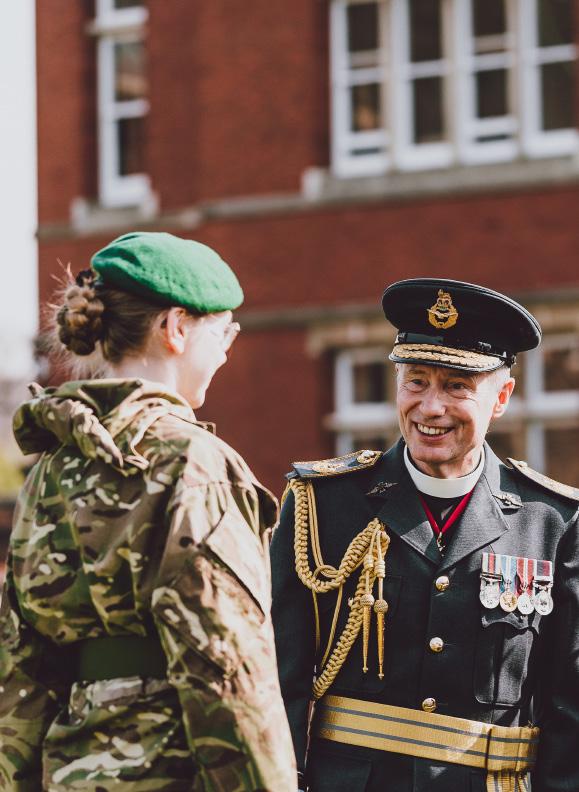
Being a CCF Cadet does not just mean participation in activities many can only dream about, it also develops a variety of skills for students to be able to lead, manage, communicate, work within a team effectively and to have the confidence and self-discipline that will help set them above others. These skills and attributes will benefit them when they are ready to start their journey through the wider world, facing their challenges and achieving their lifelong ambitions and goals. Achievement of personal goals is through the successful combination of a hard-working and dedicated staff team, but above all else, a hard-working and dedicated CCF of cadets. Bedford School CCF believes in going as far as it can see, then going further once it has got there.
Sixth Form RAF Section Cadet, Ariadna Whittle-Queral explained: “As a Senior NonCommissioned Officer (NCO), I’ve soared
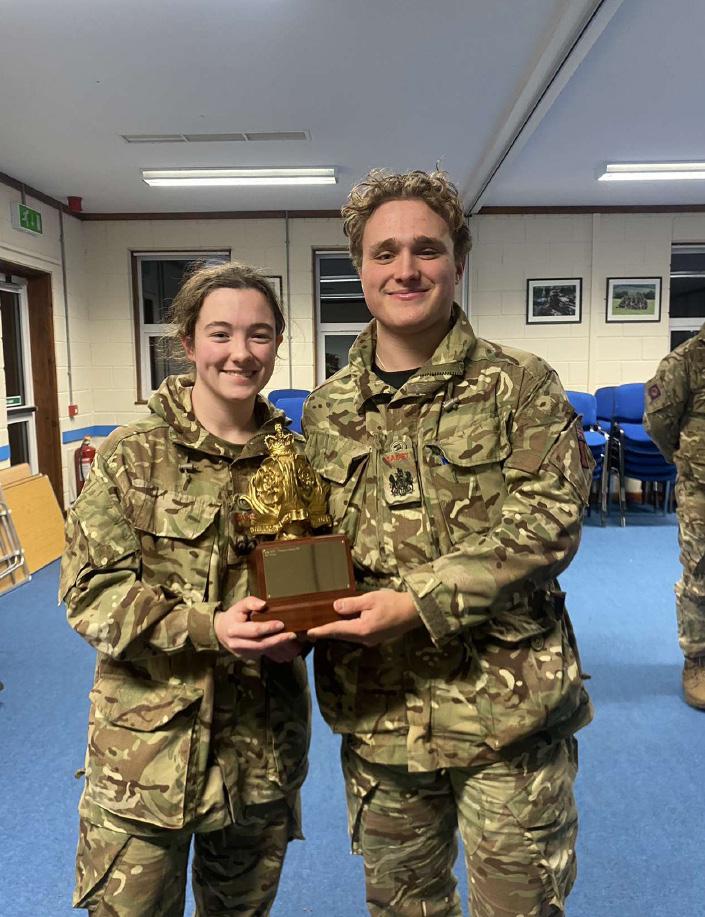
to new heights both in the skies and in my educational journey.
“The invaluable experiences and skills I’ve gained through this incredible programme have propelled me towards the gates of university. From honing my leadership abilities to fostering discipline and teamwork, the CCF RAF cadets has given me the wings to reach my academic aspirations, ensuring that the sky’s not the limit, but merely the beginning of my future success.”
BGS RAF Section Staff, Mrs Elizabeth Hooker, said: “Being a part of the CCF RAF section has been an incredible journey that has equipped me with invaluable life skills. From developing leadership abilities to fostering resilience and discipline, this extraordinary experience has shaped me into a confident individual ready to take on any challenge that comes my way.”
Dr Tansell concluded: “If you relish the thrill of pushing your limits, embracing the camaraderie of an accomplished, passionate and driven team, and immersing yourself in an unparalleled array of activities found within the United Kingdom, then CCF is the perfect choice for you!”

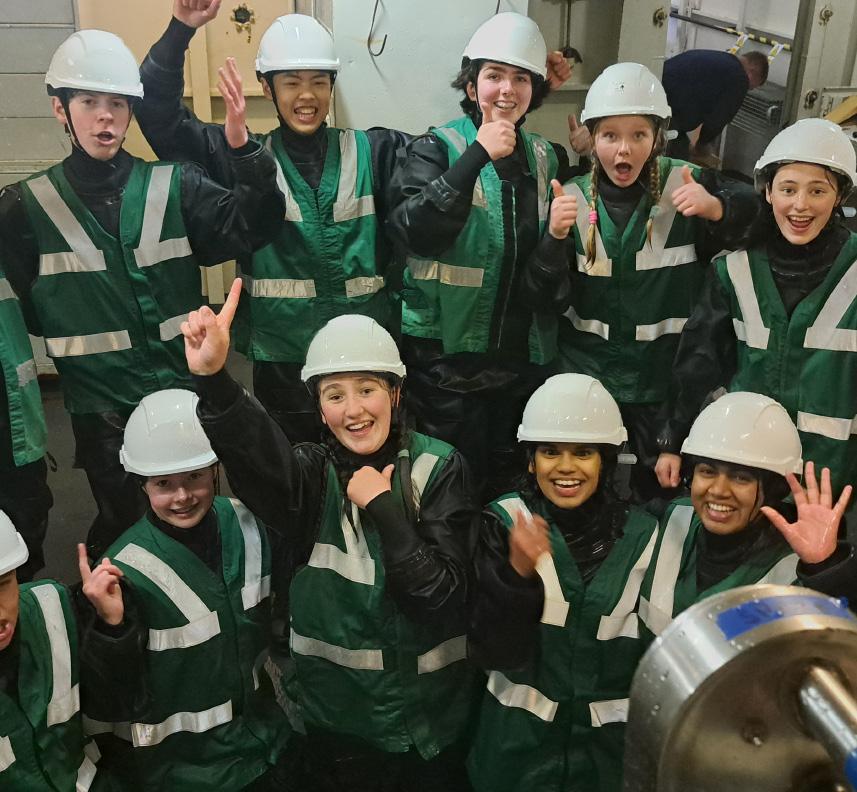
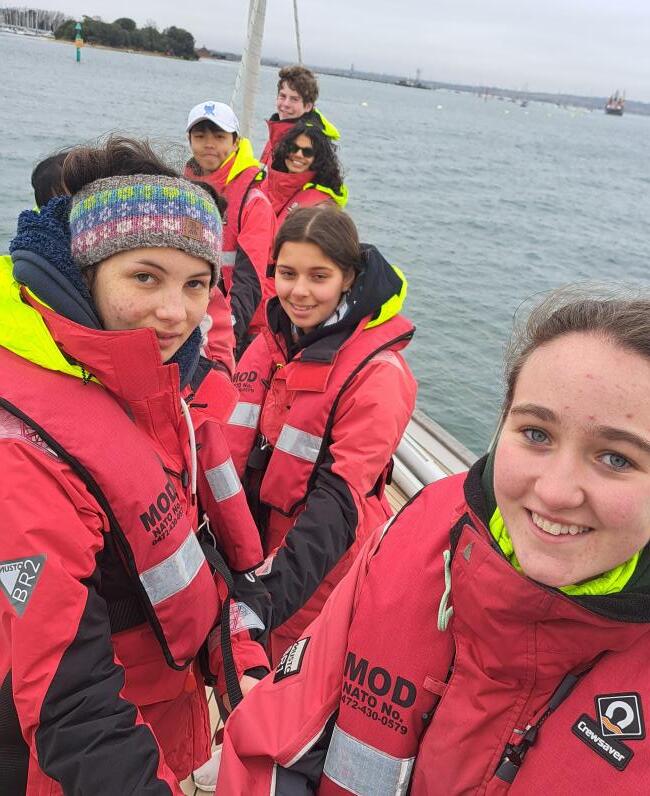
Have you heard of Dame Pat McGrath? CEO and owner of an international makeup brand, recently valued at $1 billion, having worked with designers such as Prada, Givenchy and Alexander McQueen, to name only a few. Contrary to what you might think, this is not why she is my legend. In my eyes, McGrath’s status as a legend stems from her journey as a self-taught makeup artist from humble beginnings who had the determination, bravery and self-assurance to make it within a cut-throat industry.
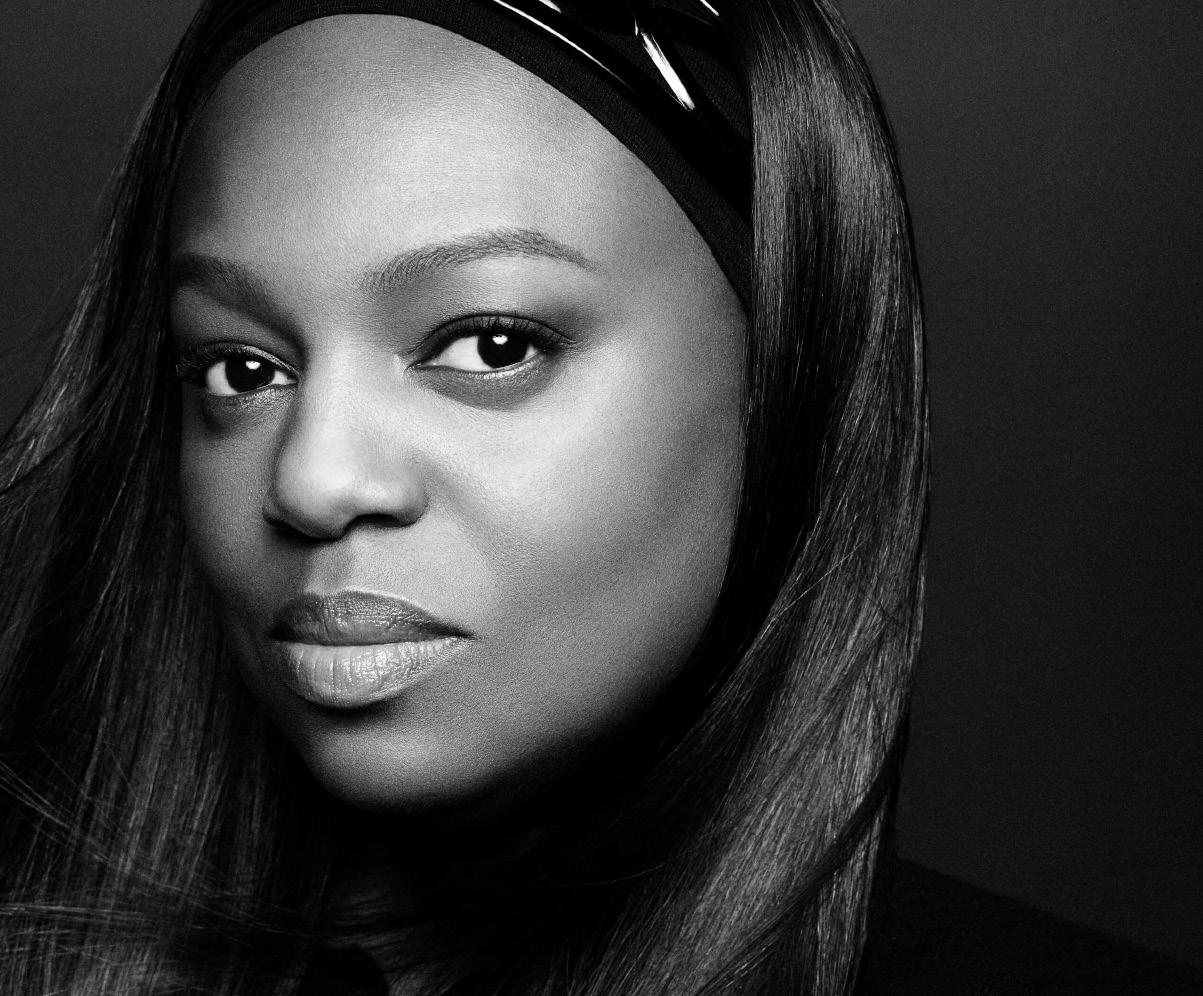
Growing up not far from Bedford, in the town of Northampton, McGrath was raised in the 1970s by her mother who was a Jamaican immigrant. She did not have the privilege of pre-existing paths into the makeup and fashion industry, but this only served to fuel her vigour for a self-made rise to the top. Completing an Art Foundation course in Northampton then dropping out of fashion school, McGrath built up contacts through club culture networking. Her first major breakthrough was a collaboration with the innovative London-based Soul II Soul musical collective. She toured Japan with them as they were breaking through internationally and she worked for nothing. Working for free for street style magazines ID and The Face, McGrath was never primarily concerned with wealth. She valued meaningful relationships created by her own efforts and establishing her reputation as bold, eager and willing to learn, above moneymaking motives. She made friends with the also now legendary Edward Enninful, current Editor-in-Chief of British Vogue, when they were both very young. They remain best friends and have both revolutionised the fashion landscape.
McGrath’s work as the ‘mother’ of modern makeup, centres around inclusivity and filling voids in the makeup industry for women of colour. In her childhood, McGrath witnessed her mother mix pigments from scratch, using cocoa powder, to find the correct shade for her dark complexion. After seeing these problems first hand, and from personal experience, she worked on creating makeup ranges, featuring highly pigmented makeup that would suit women of colour, as well as being appropriate for all skin shades. This revolutionised the
accessibility of makeup to everyone, actively combatting the narrow range of makeup available on the market for so long. McGrath’s truly inclusive outlook, saying, ‘beauty has nothing to do with gender, race or age’ but has ‘everything to do with confidence, individuality and character,’ cements her as a figurehead for changing values in an industry that is greatly superficial. Makeup is not only based on aesthetics and physical looks, and McGrath has been instrumental in reinventing beauty as something more than skin deep. For her own brand, McGrath makes a point of using models with a range of body types, eager to push the boundaries of what is considered conventional beauty and create new spaces for innovation and diversification.
McGrath has spoken about the time spent with her mother, a dressmaker, and the process of sourcing fabrics and then makeup, intricately matching shades and taking inspiration from the patterns and colours in the fabrics to create looks. Perhaps this serves to illustrate the importance of the processes behind creating the final result, mirroring her rise to success as something not instant, but borne out of hard work and attention to detail, not
chance. I believe that Pat McGrath can teach us all important lessons of resilience and resourcefulness, when chasing our ambitions. She utilised club culture in Soho to create connections and get herself noticed within creative spaces, following celebrities and musicians around London, beginning to be spotted with her bold lipstick used on cheeks, eyelids and lips.
I admire Pat McGrath for her ability to create trends and not follow them, never afraid to do things not witnessed before. Her own belief that the industry’s insiders were often social outsiders in their early years, further cements the beauty of non-convention and the value of each and every one of us being uniquely different. Her ‘feel the fear and do it anyway’ attitude is something we can all take away, not being scared to be an auteur; original, different and exciting.
So, Pat McGrath is my legend, not for her wealth or fame, but for her journey and her character. The top of the mountain is nothing without the climb, and her story epitomises the importance of this, and how rewarding hard work can be.
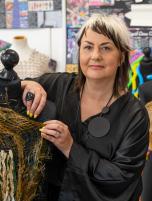 Mrs Rachel Maughan Textiles Teacher
© Ben Hassett
Mrs Rachel Maughan Textiles Teacher
© Ben Hassett